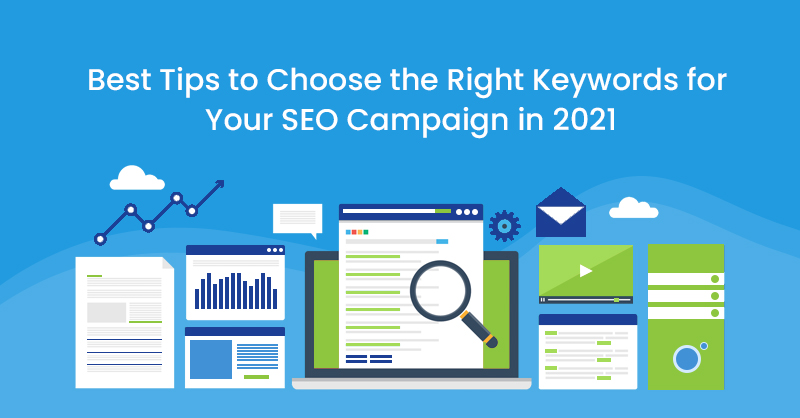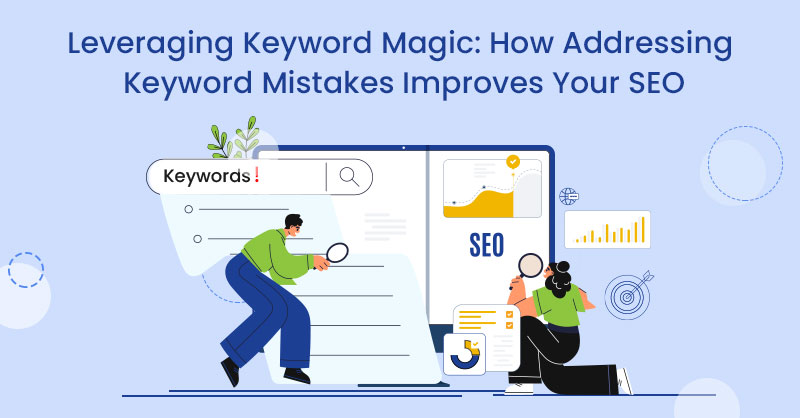Are you planning to launch an SEO campaign to boost organic traffic to your website? Not sure how to find the right keywords for your website?
If that's the case, you've come to the right place.
When it comes to keyword research, you'll have many questions because it's one of the most significant aspects of SEO strategy. Although there are numerous tools and resources accessible for keyword research, it might be challenging to find target keywords that are relevant to your website. Here we’ll look at some of the tips to choose the right keywords for your SEO campaign.
Create a List of Relevant Keywords
To begin, make a list of keywords in Google Sheets or Excel by considering all of the aspects mentioned below.
Determine Your Target Audience

First of all, imagine yourself in the shoes of a customer and ponder what you would Google to find a product or service. You can also ask your family and friends for suggestions on what they would search in Google to find a particular product or service. In short, by doing this, you will be able to understand the search intent of consumers.
Everyone does a Google search with a specific goal in mind that is called "search intent". Normally search intent can be divided into 3 categories:
- Navigational Intent
- Informational Intent
- Commercial Intent
Navigational Intent - When we search for a particular website, it falls under Navigational intent. For example, if users search “Amazon” on Google, they will be directed to Amazon.com.
Informational Intent- Here users search for specific information or topic. When we search for Amazon's founder, it can be regarded as Informational Intent.
Commercial Intent- If users are searching for something to buy, it can be classified as transactional intent. It is a transactional intent if the searcher types "buy a smartwatch."
Obtaining high-volume keywords relevant to your brand is great. But finding keywords that match your target audience’s search intent, on the other hand, will boost conversion rates.
Keep an Eye on the Competitor

Figure out your main competitors and visit their websites. Examine their website’s content, metatags, and other elements to determine the keywords they're targeting. Analyzing your competitors' keywords can help you remember keywords you've missed and get new ideas.
Focus on Long-Tail Keywords
A phrase with more than three words is referred to as a long-tail keyword. According to human psychology, while searching for something, people seem to be more specific. For example, instead of searching for “restaurants near me,” we may search for “best vegetarian restaurants near me” or “top Chinese restaurants near me” etc. Hence long-tail keywords help to boost conversion rates. While searching, people are obsessed with the words like best and top, so try to include them.
Make use of keyword research tools
We've already compiled a list of keywords, now let's take a closer look at the keywords. Keyword research tools help us in determining keyword volume and patterns, keyword competition, related keywords, and more.
While thinking about keyword research tools the first tool that comes to mind is Google's Keyword planner. However, the problem with Google Keyword Planner is that it does not provide you with the exact search volume, it only gives you a range. You can also rely on keyword research tools like Ahrefs, SEMRUSH, Answer the Public, Ubersuggest, KW finder, etc.
Even though Ahrefs is a paid tool, it helps in conducting comprehensive keyword research. It helps to explore competitors' keywords and which keywords contribute more traffic to their website.
SEMRUSH, on the other hand, provides free keyword research. However, if you are willing to pay for this tool, a lot of useful features can be explored.
Go Over the Results and Analyze Them
We have determined keyword volume, keyword difficulty, keyword competitiveness, and other factors using keyword research tools. Now we must study and evaluate them thoroughly. While choosing keywords, search volume is crucial, it should also be relevant, and try to choose trending keywords that your competitors are using.
Insert keywords wherever possible and never forget to include them in:
Meta Title - It is essential to add keywords in the title and headings because it helps you in achieving higher search engine rankings. By adding keywords in the title, both users and robots (crawlers) understand the content of your website. In short, it helps in determining the relevance.
Meta Description- When we search for something on Google, we can see a description of the content beneath the meta title or clickable link, known as the meta description. We must also provide our primary keyword here because people read this description before visiting a website to get an idea of the content. If the main keyword isn't there, they won't visit the website.
Social media posts - When you share your site content on social media, you can help visitors focus their searches by incorporating relevant hashtags, which are just as effective as a keyword.
Closing Thoughts
Keyword research is an integral part of SEO. Even though keyword research is time-consuming and challenging, it pays off in the end. If you follow the guidelines mentioned above, you will end up with a list of effective keywords.
If you have any questions or need assistance with SEO services, contact our digital strategists at TechWyse today!







on
I have read this article and found helpful for the readers. I hope you will continue this job and provide valuable content for the visitors
on
Thanks for sharing such an informative Post. I enjoy a lot while reading. Keep sharing your best posts.